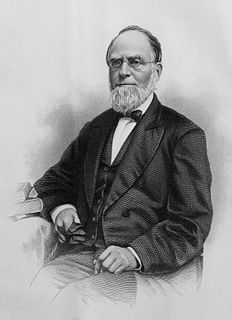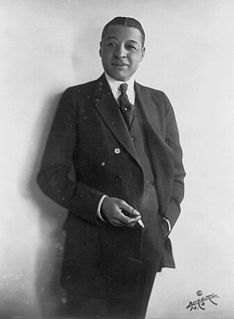A Quote by Francois de La Rochefoucauld
A man convinced of his own merit will accept misfortune as an honor, for thus can he persuade others, as well as himself, that he is a worthy target for the arrows of fate.
Related Quotes
In the absence of government each man learns to think, to act for himself, without counting on the support of an outside force which, however vigilant one supposes it to be, can never answer all social needs. Man, thus accustomed to seek his well-being only through his own efforts, raises himself in his own opinion as he does in the opinion of others; his soul becomes larger and stronger at the same time.
Man—every man—is an end in himself, not a means to the ends of others; he must live for his own sake, neither sacrificing himself to others nor sacrificing others to himself; he must work for his rational self-interest, with the achievement of his own happiness as the highest moral purpose of his life.
No man, however enslaved to his appetites, or hurried by his passions, can, while he preserves his intellects unimpaired, please himself with promoting the corruption of others. He whose merit has enlarged his influence would surely wish to exert it for the benefit of mankind. Yet such will be the effect of his reputation, while he suffers himself to indulge in any favourite fault, that they who have no hope to reach his excellence will catch at his failings, and his virtues will be cited to justify the copiers of his vices.
Let no one imagine that he will lose anything of human dignity by this voluntary sell-out of his all to his God. He does not by this degrade himself as a man; rather he finds his right place of high honor as one made in the image of his Creator. His deep disgrace lay in his moral derangement, his unnatural usurpation of the place of God. His honor will be proved by restoring again that stolen throne. In exalting God over all, he finds his own highest honor upheld.
Impress upon children the truth that the exercise of the elective franchise is a social duty of as solemn a nature as man can be called to perform; that a man may not innocently trifle with his vote; that every elector is a trustee as well for others as himself and that every measure he supports has an important bearing on the interests of others as well as on his own.
But a man's best friend is the one who not only wishes him well but wishes it for his own sake (even though nobody will ever know it): and this condition is best fulfilled by his attitude towards himself - and similarly with all the other attributes that go to define a friend. For we have said before that all friendly feelings for others are extensions of a man's feelings for himself.
Man is an evasive beast, given to cultivating strange notions about himself. He is humiliated by his simian ancestry, and tries to deny his animal nature, to persuade himself that he is not limited by its weaknesses nor concerned in its fate. And this impulse may be harmless, when it is genuine. But what are we to say when we see the formulas of heroic self-deception made use of by unheroic self-indulgence?
He who loathes war, and will do everything in his power to avert it, but who will, in the last extremity, encounter its perils, from love of country and of home--who is willing to sacrifice himself and all that is dear to him in life, to promote the well-being of his fellow-man, will ever receive a worthy homage.



































